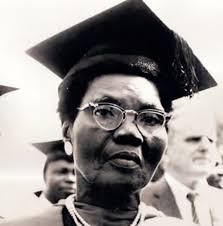
Tears trickled down faces as busy bodies moved right, left, paying tribute to the fallen hero. Did she even fall? No, she only moved into the realm of the heavens, joining the league of legends. “Is the Lioness of Lisabi gone?” “What kind of Country is this?” Amidst troops of unanswered rhetorics, women moved in numbers, while men moved in and out, massively honoring the hero of liberty as she was laid to rest. Pain shuttered in the crowd as she was given to the dust, covered up. By-standing women continued to remark, “Our heroine is asleep, Funmilayo Ransome-Kuti is gone; she came, she saw, she conquered. We shall always remember, and uphold her legacies.”
Injustice?
As a mother figure and socio-contributor, Ransome-Kuti visited her son, Fela Kuti at the Kalakuta Republic on 18 February 1977, only for the Republic to be violently attacked by armed men: destroying property, maiming occupants and would later throw Ransome-Kuti from the second floor, a landing which challenged whatever existence of justice in Nigeria. She later rested in peace after the exacerbation of the sustained injuries, making Fela Kuti to bitterly retort, “Which kind injustice is this?”
Lifestyle for liberty
Funmilayo Ransome-Kuti, the Lioness of Lisabi as she was fondly called, was a Nigerian born and bred political activist, teacher, social worker, women emancipation vanguard, importantly, mother and a wife. She lived an extraordinary life which remained historic and evergreen. In a simple life-way, she looked out for fellow women, especially the market women, illiterates, built an empire of hope with them and struggled together to voice against women’s oppression in Nigeria and Africa in large.
Depicting liberty in full, she would later endorse her son’s musical criticism of the Nigerian and African governments at the post-Independence era; a reason why she was occasionally at the Kalakuta Republic to identify with Fela; demonstrating love, care, mentor that motherhood signifies, and joining to amplify voices against the high handedness of the military rulers in Nigeria.
Activism for Women Emancipation
Regarded as the mother of women emancipation in Nigeria, a progressive revolutioner, and a PanAfrican, Ransome-Kuti struggled with other women in Nigeria to create a voice for the womanhood in the political, social, and economic spheres; leading to the formation of ‘The Abeokuta Ladies Club’ – a group committed to charity, sewing, catering and adult education.
Ransome-Kuti realized early enough that for the women’s struggle for liberty and recognition to be respected, economic independence of women is paramount, this moved her to organize regular trainings for women on catering, sewing, literacy, and self-defense; bringing other educated women into the fold such as Grace Eniola Soyinka with whom she co-founded the ‘Abeokuta Women’s Union (AWU), focusing on fighting unfair price controls and taxes imposed on women.
Influence on Women Emancipation
She fought for women to be economically independent, recognizing the place of negotiation, dialogue, consultation, confrontation, and consolidation – a lioness indeed. She vigorously led a successful campaign to stop local authorities seizing rice from market women under false pretense.
Surging the emancipation spirit in women, Ransome-Kuti led women in thousands to protest against the arbitrary taxes imposed on them at the palace of the Ọba of Egba at the visit of the British District Commissioner. At the initial stage unnoticed, the traditional council would later recognize the women’s plight and canceled the taxes after heavy protests.
Roles on Socio-political emancipation of women
Ransome-Kuti was actively involved in politics. Building grassroot political support for full women participation, in 1950, she was appointed to the Western House of Chief, becoming the first woman to be appointed to the House. On the platform of National Council of Nigeria’s Citizens in 1951, she contested as a regional assembly member but was not elected. Undeterred, she continued her struggle for women emancipation with a sole focus on women’s enfrachisement- an adult suffrage recognizing the right of women to vote and be voted for, which would be later recognized by the constitution in Nigeria.
Understanding the nature of Nigeria’s politics, Ransome-Kuti detested subjecting women to violence, maltreatment or injustice. She trained women in how to deal with tear gas canisters which were sometimes thrown at them at protests and peaceful demonstrations. She would later ensure that the women’s group used their membership dues to cater for suffering women, their health, and fund legal representations of arrested members.
As a pioneer of women franchise advocate in Nigeria, she was the only woman to represent Nigeria in the NCNC 1947 delegation to London and at a Western Province Conference in Nigeria held in 1949, speaking vehemently on women enfrachisement.
Career and All Range Influence
Ransome-Kuti was a teacher, a passionate lover of education. Aside from organizing adult literacy classes for women, she dedicated her lifetime to serving at the core fronts of educational activities in Nigeria. She catalyzed education in teaching and advocating for enfrachisement, political relevance, political participations, socio-economic Independence for women; evident in her cascade of press conferences, petitions, demonstrations, speeches and representations with other women in Nigeria and beyond; active roles which later earned her the Presidency of the NCNC’s Women organization.
Honour for the Sailor of Women Emancipation
Adorning her excellent spirit of liberty and drive for women emancipation, the University of Ibadan awarded Ransome-Kuti an honorary doctorate of law in 1968 after receiving a national honour of Membership in the Order of Niger, MON in 1963. She would later receive the Lenin Peace Price in 1970 for her historic contributions to peace, political freedom and participation, and emancipation. She later committed her life after resting from active politics to building schools across Abeokuta, Nigeria- a legacy that lives till today.
One can understand the extent of the agony at the instance of her demise. But is the Lioness of Lisabi, Ransome-Kuti really gone? Her legacies, achievements, inspired lives and the liberated womanhood in Nigeria and beyond reflect the liveliness of the heroine, Ransome-Kuti, the sailor of women emancipation lives on.
Afolabi writes from Ibadan.















